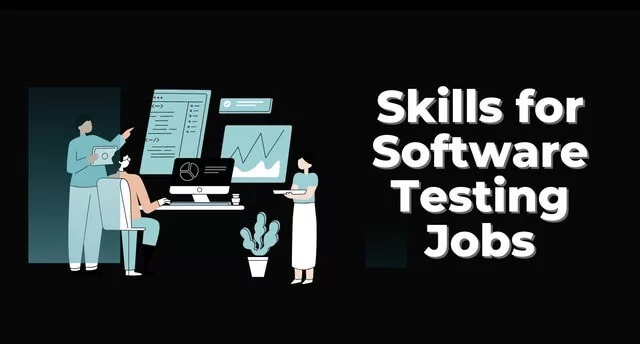One must be a professional in order to have the necessary skill sets and know-how to complete any professional assignment or job. The requirements, albeit they may differ depending on the profile, must be well understood. The Skills for Software Testing Jobs has two key sections, the first of which is the technical expertise needed to do the task without error. The soft skills you need to have in addition to your technical implementation come next. Now, it’s important to recognize that both abilities work together to get the intended results.
The information delivered through this article will help you understand the skills required for automation testing jobs as well as what a software tester does.
What is Software Testing?
Software testing is one way to go through the fundamental checkpoints to make sure that the client gets the exact results they are looking for based on their business requirements. The goal is to identify any flaws or unneeded defects that could jeopardize the successful operation of the software-based application. Prior to this, the problems must be identified before they are analyzed, and determine their causes and potential solutions.
The program goes through a fundamental review procedure about its commercial and technical aspects before it is released or deployed in production, using the skills necessary for software testing.
What Does a Software Tester Do?
The process of creating applications requires the work of software testers. They are quality assurance professionals who thoroughly examine new digital products to make sure there are no bugs, to get rid of bad performance, and to remove interface problems.
Testers run a range of tests at different stages of the software lifecycle to accomplish the goal. These tests could include stress tests, performance tests, functional tests, scalability tests, or user acceptability tests.
Testers are typically brought in at the nascent stages, such as planning and design, because software testing is so important to the quality and usability of the finished product.
Testers frequently join development teams. The DevOps process, which mixes development and operations, is used to generate a very large number of software products today. Using agile, lean, or Scrum principles and methods, this methodology employs a continuous loop for development, testing, and delivery. Overall, software testers make sure that the program is user-friendly and performs as promised.
Necessary Skills for Software Testing Jobs
Technical Skills of a Software Tester
- Programming skills- This is a crucial ability that can help you succeed in a variety of software-related jobs. It is critical to realize that a software tester’s duties extend beyond merely handling user interface issues. To prepare or validate the test data, one must also understand how to connect directly to the database or use the software’s interface.
- Frontend skills- One of the software test engineer’s talents, dealing with application interfaces can be done with the use of frontend language commands. Being a testing specialist, you must process a fundamental understanding of front-end technologies. That, too, while reading the code and the pertinent automation process in accordance with the need.
- Backend skills- Individual testing for some of the parts of a system or application may be necessary at times. A component without a user interface is more difficult to manage. Understanding backend technologies like REST (Representational State Transfer) or SOAP (Simple Object Access Protocol) API databases may be useful in this case.
- Knowledge of database and SQL- Software systems typically run in the background with enormous volumes of data like payroll software. These days, numerous databases, such as MySQL or Oracle, can be used to store this data. As a software tester, you may occasionally need to verify this information. In that situation, SQL queries will be used to determine whether the correct data is saved in your databases.
- Practical knowledge of test management tools- A critical component of software testing is test management. You must have the right tools and strategies for test management. The main focus of test management is managing your testing-related artifacts. For instance, test management solutions make it easier to keep track of all the test cases your team has created. You must be familiar with using these solutions because the majority of businesses do.
Non-Technical Skills of a Software Tester
- Analytical skills- Software testers must possess keen analytical faculties. To design test cases, you must learn how to deconstruct a complicated software system into smaller components and obtain a deeper comprehension of it.
- Communication- A software tester needs to be a master communicator both orally and in writing. After all, it’s you who will be producing the testing artifacts, which may include test cases, test plans, test techniques, problem reports, and more. They must all be straightforward to read and understand.. Furthermore, a development team will be working with you. When problems arise, dealing with developers will take tact.
- Organizations and time management skills- Testing may be an extremely taxing task, particularly right before a release. To make it all work, a tester must effectively manage their workflow, be productive, and possess exceptional time management abilities. Instead of interfering with the work of your team, you need to become an asset.
- Passion for testing- You must be passionate about your work if you want to excel at it. whether you’ve never tested software before, just give it a shot to see whether you like it. You’ll be able to tell if the field intrigues you or if you should pursue something different.
Conclusion
Simply put, in order to deliver in the best manner possible without compromising quality and meeting the timeline. The technical knowledge required to be a software tester must be adequately backed by the appropriate soft skills.
The development of each performer is aided by this tight balance of various software tester skill sets. Additionally, it increases an organization’s long-term success rate, benefiting all the concerned parties and creating a win-win situation.
As a candidate, you can select from the top software testing programs to cover all the essential topics and provide you with the necessary skills.











